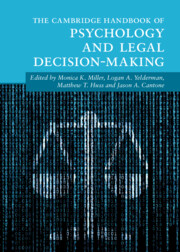Book contents
- The Cambridge Handbook of Psychology and Legal Decision-Making
- Cambridge Handbooks in Psychology
- The Cambridge Handbook of Psychology and Legal Decision-Making
- Copyright page
- Dedication
- Contents
- Figures
- Tables
- Editors
- Contributors
- Part I Introduction Chapters
- 1 A Modern Approach to the Psychology of Legal Decision-Making
- 2 “I Hope the Final Judgment’s Fair”
- 3 Diversity and Bias in Legal Decision-Making
- 4 Judicial Decision-Making
- Part II Pretrial Phase Decision-Making
- Part III Trial Phase Decision-Making
- Part IV Postconviction Phase Decisions
- Part V Other Legal Decision-Making
- Part VI Perspectives from the Field
- Part VII Conclusion
- Index
- References
1 - A Modern Approach to the Psychology of Legal Decision-Making
from Part I - Introduction Chapters
Published online by Cambridge University Press: 22 February 2024
- The Cambridge Handbook of Psychology and Legal Decision-Making
- Cambridge Handbooks in Psychology
- The Cambridge Handbook of Psychology and Legal Decision-Making
- Copyright page
- Dedication
- Contents
- Figures
- Tables
- Editors
- Contributors
- Part I Introduction Chapters
- 1 A Modern Approach to the Psychology of Legal Decision-Making
- 2 “I Hope the Final Judgment’s Fair”
- 3 Diversity and Bias in Legal Decision-Making
- 4 Judicial Decision-Making
- Part II Pretrial Phase Decision-Making
- Part III Trial Phase Decision-Making
- Part IV Postconviction Phase Decisions
- Part V Other Legal Decision-Making
- Part VI Perspectives from the Field
- Part VII Conclusion
- Index
- References
Summary
Decisions made within the legal and criminal justice systems are often consequential, shaping the lives of individual people and providing a foundation by which people perceive, interpret, and understand justice. These decisions are made by individual people (e.g., judges, case workers, and attorneys) and collectives (e.g., juries, legislatures, and parole boards), and often have far-reaching implications. Together, they create a historical backdrop to how society views and comprehends current legal decision-making. This book provides a comprehensive understanding and detailed synthesis of legal decision-making research, examining theories and decision models and discussing applications to law, policy, and practice from a psychological perspective.
- Type
- Chapter
- Information
- Publisher: Cambridge University PressPrint publication year: 2024

